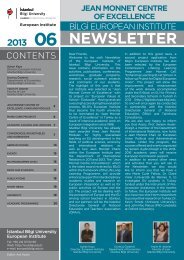WP2 Turkey: Country Report - İstanbul Bilgi Üniversitesi | AB Enstitüsü
WP2 Turkey: Country Report - İstanbul Bilgi Üniversitesi | AB Enstitüsü
WP2 Turkey: Country Report - İstanbul Bilgi Üniversitesi | AB Enstitüsü
You also want an ePaper? Increase the reach of your titles
YUMPU automatically turns print PDFs into web optimized ePapers that Google loves.
Social Impact of Emigration and Rural-Urban Migration in Central and Eastern Europe<br />
VT/2010/001<br />
as difficult as ever. A new phenomenon in this regard, that might alter the picture, is the fact<br />
that recently a new wave-of highly-skilled and of younger generation is heading for <strong>Turkey</strong>,<br />
eager to engage in entrepreneurial activities. This is certainly a window of opportunity for<br />
<strong>Turkey</strong>.<br />
Internal migration has always been a source of concern since the 1960s, creating various<br />
challenges such as poverty, exclusion, discrimination, unemployment and inequality. Ruralurban<br />
migration has brought about sharp demographic deficits across the geographical<br />
regions creating enormously big cities like Istanbul, Ankara, İzmir, Antalya and Bursa. <strong>Turkey</strong><br />
is still trying to come to terms with these demographic deficits in a time when the big cities<br />
are going through a process of deindustrialization in a way that leads to the double-migration<br />
of the earlier unqualified and/or semi-qualified migrants to the neighbouring cities such as<br />
Istanbul-Gebze (İzmit) nexus. 45<br />
Nowadays, what is really essential for <strong>Turkey</strong> is to remedy detrimental effects of forced<br />
migration originating from the East and Southeast <strong>Turkey</strong>. So far, incentives such as “Return<br />
to Village” have not successfully worked out. There are recently some EU-funded projects<br />
designed to generate attempts to integrate the IDPs and their children into the urban space.<br />
One should also acknowledge that this problem cannot be separated from the larger Kurdish<br />
issue that the country has been so far unable to provide a long-lasting and sustainable<br />
solution, and therefore to the extent that the general problem continues to exist, IDPs’<br />
specific needs may not be answered fully.<br />
7.2. Policies to be taken by different actors<br />
International Migration: <strong>Turkey</strong>’s major challenge with respect to the emigrants is the<br />
intensity of the debates about the lack of integration into their countries of settlement. The<br />
current tendency is reducing integration to cultural assimilation, which corresponds to a<br />
process portrayed by the return of assimilation and homogenization. One could challenge<br />
such a tendency in at least two ways: Firstly, one could say that this is a rather outmoded<br />
definition of integration, which fails to include structural, political, civic, marital,<br />
identificational, and behavioural components of integration. Secondly, one could also argue<br />
that the integration of migrants can no longer remain a one-way process in the age of<br />
globalization. It should rather be transnationalized with the involvement of not only the<br />
receiving country but also the sending country and supranational or international<br />
organizations like the European Union, Council of Europe and the Organisation for Security<br />
and Cooperation in Europe (Kaya, 2009).<br />
On the other hand, <strong>Turkey</strong> should also take active part in laying down the ground to promote<br />
circular migration, involvement of diaspora in economic development, and validation of skills<br />
acquired abroad.<br />
1. <strong>Turkey</strong> should adopt a more flexible legal framework that offers legal migrants the<br />
possibility of free movement between <strong>Turkey</strong> and the countries of destination whilst<br />
preserving their immigration status in the country of destination. Blue Card system can<br />
be substantialized in this regard for those emigrants who relinquished their Turkish<br />
citizenship, permitting them to keep their social, economic, civil rights other than<br />
political rights;<br />
2. In order to promote development, <strong>Turkey</strong> should try to have bilateral agreements with<br />
the countries of destination to launch training and Manpower-raising skills programmes,<br />
transfer of competence, know-how and flows of foreign capital and conduct<br />
development projects coupled with development-aid. <strong>Turkey</strong> should co-operate with<br />
destination countries to compensate the loss of skills through policies aimed at<br />
45 The work of Tezcan (2011) is an excellent piece in the sense that it eloquently explains the way in<br />
which migrant families of Istanbul with various qualifications, or with no qualification, are recently<br />
migrating to Gebze, a district between Istanbul and the neighbouring city of Izmit towards the east.<br />
Tezcan portrays how industrial production shifts from Istanbul to the hinterland of the city.<br />
Final <strong>Country</strong> <strong>Report</strong> <strong>Turkey</strong> 34



